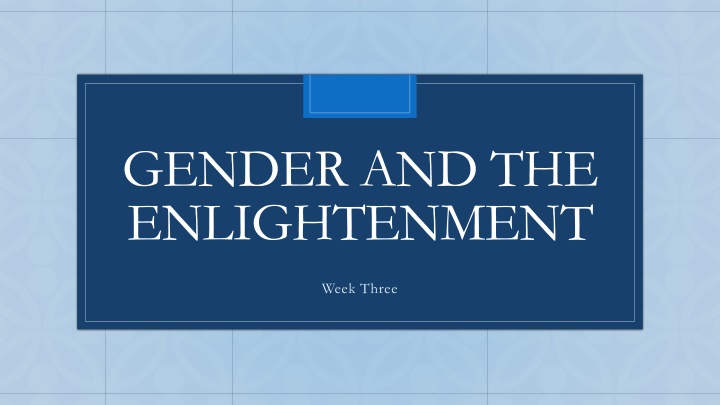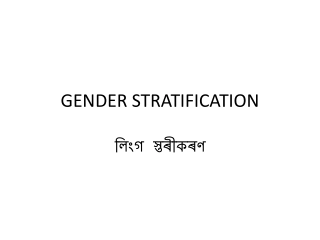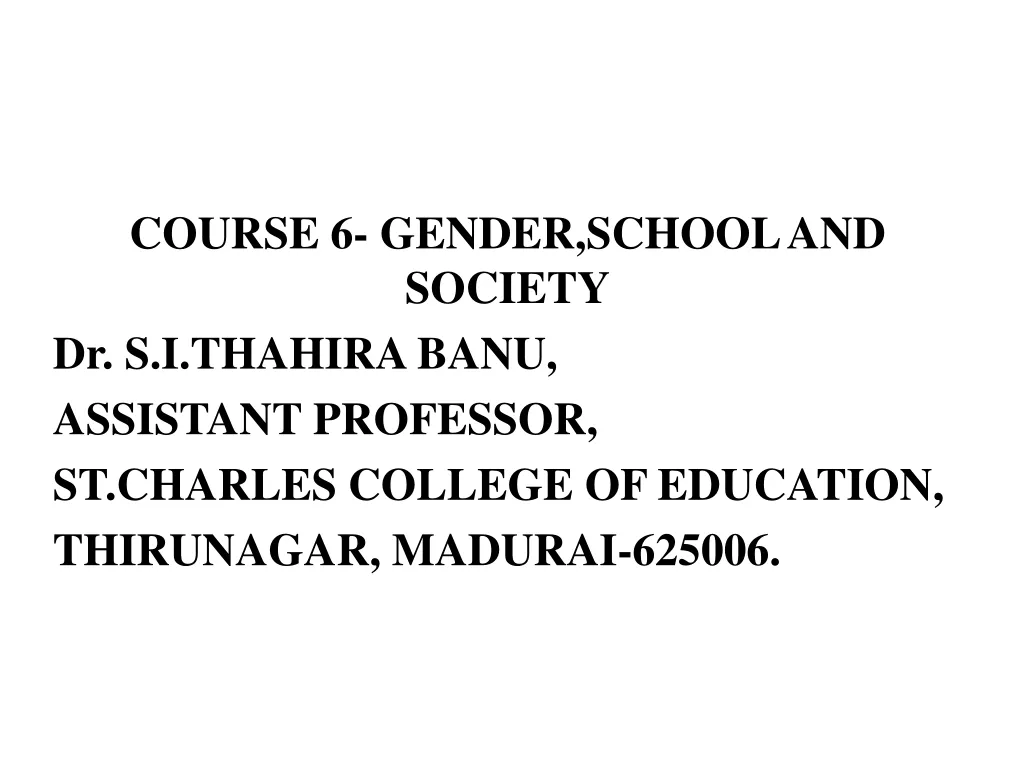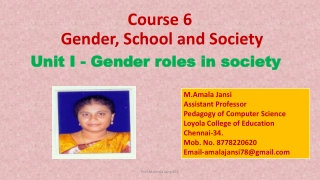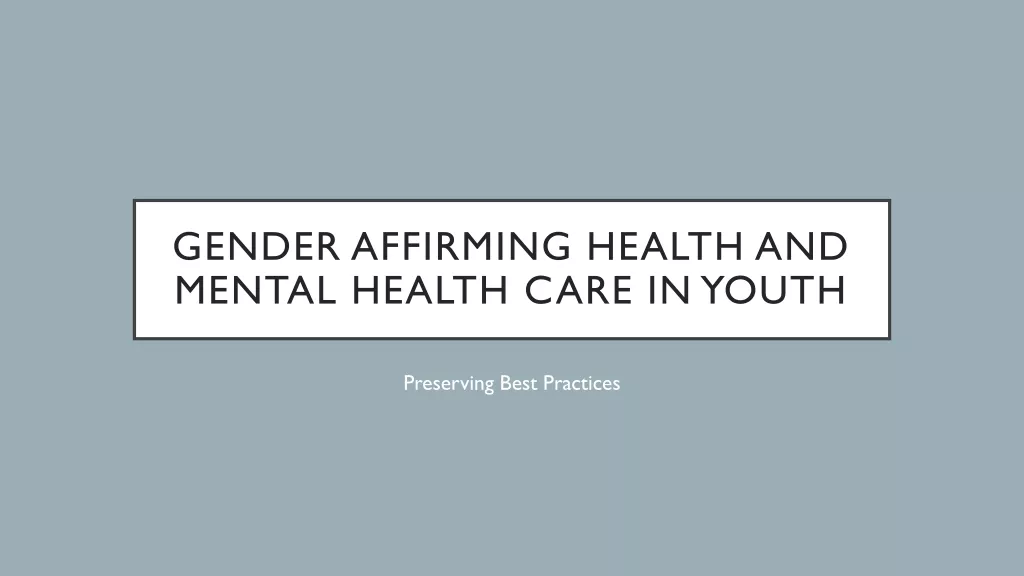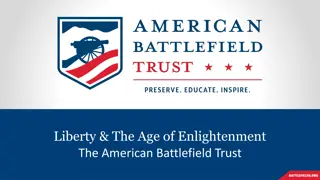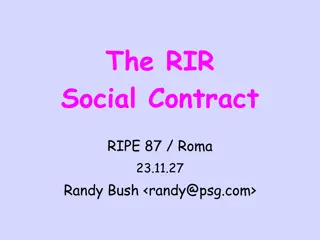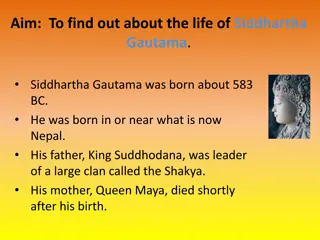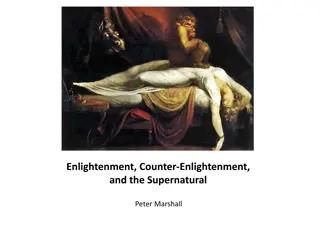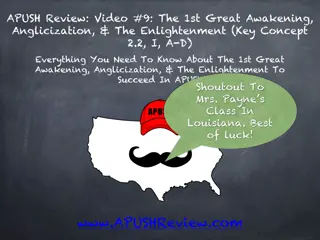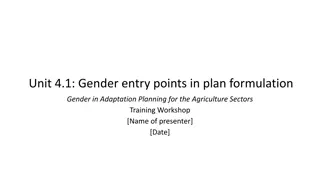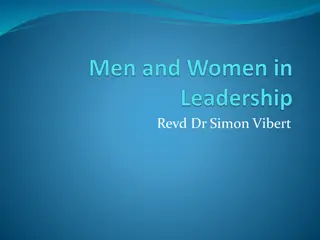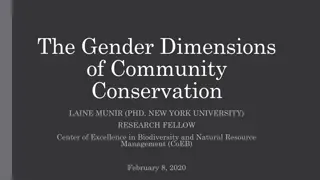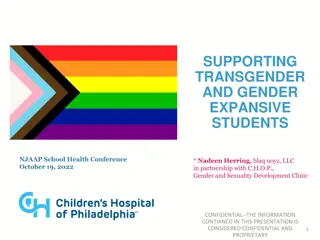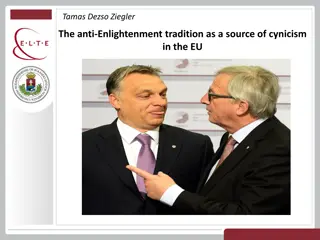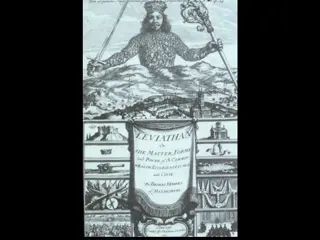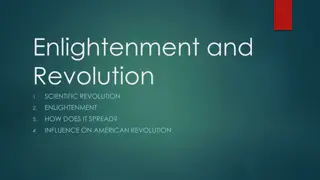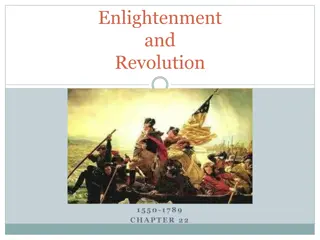Gender and the Enlightenment: Understanding Perspectives on Gender Roles
This study delves into the Enlightenment period, exploring the views on gender, female participation, men and feminism. It discusses key figures like Jean-Jacques Rousseau and their beliefs on gender distinctions. The text examines how education was perceived to shape gender roles within society, shedding light on the complexities of the era.
Download Presentation

Please find below an Image/Link to download the presentation.
The content on the website is provided AS IS for your information and personal use only. It may not be sold, licensed, or shared on other websites without obtaining consent from the author.If you encounter any issues during the download, it is possible that the publisher has removed the file from their server.
You are allowed to download the files provided on this website for personal or commercial use, subject to the condition that they are used lawfully. All files are the property of their respective owners.
The content on the website is provided AS IS for your information and personal use only. It may not be sold, licensed, or shared on other websites without obtaining consent from the author.
E N D
Presentation Transcript
GENDER AND THE ENLIGHTENMENT C Week Three
Outline 1. What is the Enlightenment? 2. Enlightened thoughts on gender. 3. Female participation. 4. Men and Feminism. 5. Conclusion.
1. WHAT IS THE ENLIGHTENMENT? C
Dare to Know! (Kant) Age of Reason : trust in experience, empiricism, scrutiny. New perspectives on: politics, economics, science, medicine, philosophy, education, literature, and history. Collection of (conflicting) attitudes and opinions. Aim: progress of humanity. Banish ignorance, intolerance and parochialism. Challenges authority of church and government.
Geography France considered epicentre Britain, much of mainland Europe and North American colonies had Enlightenment movements. John Locke - grandfather of Enlightenment. Roy Porter- the French philosophes admiration for their English predecessors demonstrates importance of the English enlightenment. Edinburgh: hotbed of genius e.g. David Hume and Adam Smith. Michael Brown, The Irish Enlightenment (2016). Danger in insular and nationalistic approaches.
2. ENLIGHTENED THOUGHTS ON GENDER. C
Historiography Critics of Enlightenment. Dominant school of thought up to 1980s. Enlightenment perceived as male phenomenon. Hobsbawm a conspiracy of dead white men in periwigs to provide intellectual foundations for western imperialism . Traditionally men seen as misogynists in new dress while women like Wollstonecraft were seen as colluding with oppressors (Taylor and Knott). Enlightenment did not improve social conditions of women or increase intellectual opportunities.
Jean-Jacques Rousseau (1712 1778) Clear gender distinction made. Family hierarchical based on natural sexual differences. Women: demands of family take priority over public role. Women: trained for a role different from that of men. Contradiction: women participate as citizens if the general will is to manifest itself. Yet in Emile participatory citizenship a male prerogative.
Emile (1762) How can education help people to retain natural goodness in corrupt society? Women and education explored in book 5. Men are strong and active, evincing power and will. Women are weak and passive, lacking resistance. Her duties are to please, attract, counsel and console her mate to make his life pleasant and happy. She has rights only so that she might perform her duties better. Woman should not culivate talents at the expense of domestic duties. Rousseau chose illustrations: http://brynmawrcollections.org/home/exhibits/show/beyondthetext/rousseau
Sophie: A perfect woman and a perfect man ought not to resemble each other in mind any more than in looks In the union of the sexes each contributes equally to the common aim, but not in the same way . Everyone who sees her will say, there is a modest and discreet girl; but while you are near her, your eyes and affections wander all over her person, so that you cannot withdraw them; and you would conclude, that every part of her dress, simple as it seems, was only put in its proper order to be taken to pieces by the imagination . Sequel: Emile et Sophie Rape viewed as adultery there is no disgrace, no crime equal to hers.
Historiography Defenders of Enlightenment. Beyond Philosophies and wider geographical scope = new understanding. Since 1990s increasing number of female writers seen as Enlightenment thinkers: Wollstonecraft, Louise D Epinay and Olympe de Gouges. O Brien re-evaluates key texts to demonstrate recognition of female agency and capacity for rationality. Enlightenment overwhelmingly positive about women in theory and practice.
John Locke (1632-1704) Hirschman and McClure - Feminist Interpretations of John Locke (2007). Unintentionally erodes patriarchal ideas. Thoughts Concerning Education (1693): Women are rational and should receive same education as men. Marriage negotiable and divorce permissible after child-rearing. Frequently praises women in public positions. However ultimately husband still head of family as men are abler and stronger . 3 types of masculinity independent rational man of commerce and the tender family man praised while warrior men of violence and irrationality criticised.
3. FEMALE PARTICIPATION C
Salons and Coffee Houses J rgen Habermas, The Structural Transformation of the Public Sphere (1962) - new civic society emerged in 18thcentury. Coffee Houses (England) and Salons (France) - spaces where state power publicly monitored. Allowed unfettered public opinion to develop. 1739 - 551 coffee houses, 207 inns and 447 taverns in London. Salons: an access point for those wishing to engage in philosophical discussions.
Coffee Houses Role of women? Edward Bramah women forbidden in Coffee Houses. Brian Cowan - Largely male sphere, limited female role. Female opposition to Coffee Houses reflects oppositions to pubs and alcohol. Some women did frequent and even run coffee houses e.g. Moll King in London.
Salons More focus on role of women. Salons gathering for conversation Key way women contributed to public life and Enlightenment in France. Women patrons of arts but also contributed to discussion. Madame Geoffrin famous Salon holder in Paris.
The Bluestocking Society Est 1750s. Met in the London homes Elizabeth Montagu, Elizabeth Vesey, and Frances Boscawen. Conversation parties intellectual community Guests prominent political figures, artists, and writers. Fashionable, wealthy and clever. Montague described as 'Brilliant in diamonds, solid in judgement, critical in talk'. 1780s height of prominence with national connections. By 1800 Bluestockings under attack.
Olympe de Gouges (17481793) French Feminist/Reformer. Handed out free pamphlets and leaflets. Declaration of the Rights of Woman and the Female Citizen (1791). Women capable of reason and morality. Different but equal. Free speech/public role Sexual equality sanction illegitimacy.
Scottish Enlightenment: Elizabeth Hamilton (1840-1882) Based in Edinburgh. Philosopher and educationalist. 1867 est. Edinburgh Ladies Education Association access to university. Anne Grant (1755-1838) Farmer s Daughter, widow with 8 children. Essays on the Superstitions of the Highlanders (1811) - noble savage .
4. MEN C AND FEMINISM
Thomas Cadell (1742-1802) Prominent London Publisher. Founding father of women s literature . Published Wollstonecraft and More alongside key male philosophers. Restrictions on content, characters and ideas to preserve respectability. Fair dealer during a time when male publishers were exploiting female authors.
William Thompson (1775-1833) Appeal of one-half of the human race (1825) - popular feminist text. Women treated as domestic/sexual slaves. Men control women to satisfy their own needs/desires. Political rights only way to save women from slavery. Refutes James Mill s Article on Government (1821): argued against granting the vote to women or working-class men. Countered idea that fathers represented interests of adult daughters with idea that they also represented sons and yet sons had the vote.
Enlightenment associated with male philosophers, ideals directed towards men. However, some women were contributing and were publically acknowledged. Impact, influence and legacy of female writers questionable. Most male philosophers had a complex and contradictory stance on women. Female writers needed co-operation of men to succeed. Not all proto feminists were female, some men actively supported female cause. Enlightenment increased public role of women in the literati even if fundamental position of women more widely in society changed little.
